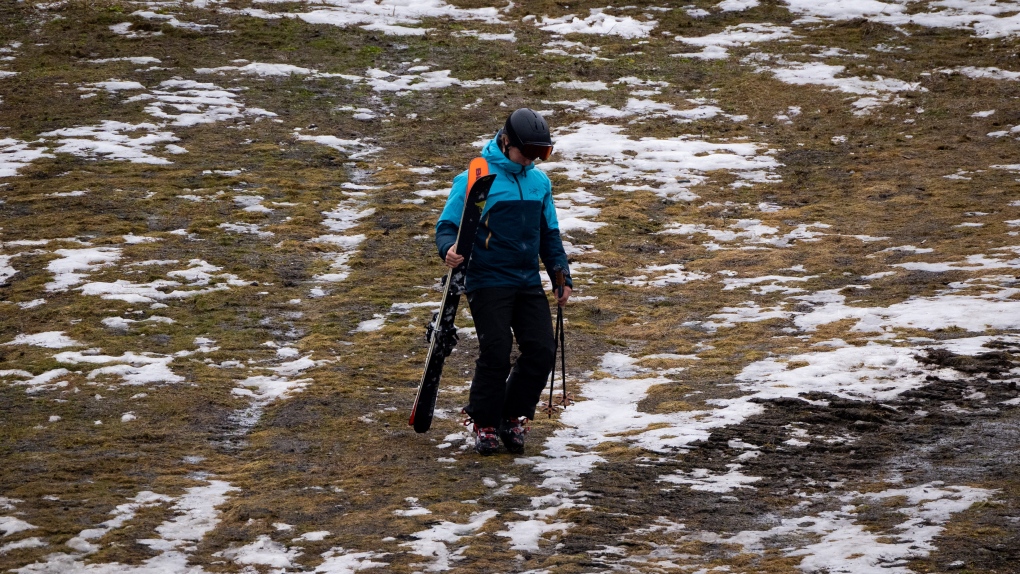Records for warmest December set or tied in Vancouver and other parts of B.C.
 A skier walks down a patchy ski slope at Whistler, B.C., on Friday, December 29, 2023. Whistler has been experiencing warm weather and little snow this season, contributing to poor snow sports conditions during peak season. THE CANADIAN PRESS/Ethan Cairns
A skier walks down a patchy ski slope at Whistler, B.C., on Friday, December 29, 2023. Whistler has been experiencing warm weather and little snow this season, contributing to poor snow sports conditions during peak season. THE CANADIAN PRESS/Ethan Cairns
Data from Environment Canada has confirmed what winter sport enthusiasts have known for a while - December was warm in British Columbia.
Five communities in the province set or equalled temperature records for the month while the warm weather, combined with a lack of rain or snow, has done little to ease ongoing drought concerns.
Meteorologist Brian Proctor said the mean temperature at Vancouver International Airport last month was 7 C, tying with 1939 as the city's warmest December on record since data started being collected in 1896.
The mean temperature was 3.4 degrees higher than what is considered normal for the month.
Proctor said Tuesday that warm weather records for December were also either set or tied in Victoria, Comox, Campbell River and Abbotsford.
The month was also very dry, meaning there wasn't enough rain or snow to ease drought concerns in the province, he said.
In the northeastern municipality of Chetwynd, for example, less than a millimetre of precipitation was recorded in December. The community usually sees about 19 millimetres.
“In general terms, it hasn't been enough to alleviate the long-standing drought,” Proctor said.
“It's helped to sort of pull it back a little bit, but what we really do need, more than anything else, is we need snowpack. And we're not getting snowpack out of these kinds of systems at this point in time.”
The province's final drought update of the year, posted at the end of November, lists eight of B.C.'s 34 basins at the two highest levels of risk for adverse drought impacts.
The northeast corner of B.C., which includes the Fort Nelson and Peace regions, remains at the highest level of drought where adverse impacts are almost certain.
Proctor says the first full week of January is expected to get cooler with some snow possible at higher elevations.
This report by The Canadian Press was first published Jan. 2, 2024.
Correction
This is a corrected story. A previous version said December wasn't warm enough to break records in British Columbia. In fact, Environment Canada now says multiple communities either broke or tied heat records.
CTVNews.ca Top Stories

Biden gives life in prison to 37 of 40 federal death row inmates before Trump can resume executions
U.S. President Joe Biden announced on Monday that he is commuting the sentences of 37 of the 40 people on federal death row, converting their punishments to life imprisonment just weeks before president-elect Donald Trump, an outspoken proponent of expanding capital punishment, takes office.
LIVE UPDATES Toronto weather: Advisories in effect ahead of 'significant' Monday snowfall
Holiday travellers and commuters could be in for a messy drive on Monday morning as a significant round of snowfall moves into the region. Here are live updates on the situation in Toronto.
The rent-a-friend industry is booming among Canada's Chinese diaspora
Dozens of people are offering rent-a-friend services on Xiaohongshu, a social media platform also known as Little Red Book or China's Instagram, in cities including Vancouver, Calgary and Toronto.
Nissan and Honda to attempt a merger that would create the world's No. 3 automaker
Japanese automakers Honda and Nissan have announced plans to work toward a merger that would form the world's third-largest automaker by sales, as the industry undergoes dramatic changes in its transition away from fossil fuels.
Green Party's Elizabeth May reflects on unprecedented week in Canadian politics
Elizabeth May says in all her years on Parliament Hill she has never seen anything like the last week in Canadian politics.
U.S. House Ethics report finds evidence Matt Gaetz paid thousands for sex and drugs including paying a 17-year-old for sex in 2017
The U.S. House Ethics Committee found evidence that former Rep. Matt Gaetz paid tens of thousands of dollars to women for sex or drugs on at least 20 occasions, including paying a 17-year-old girl for sex in 2017, according to a final draft of the panel's report on the Florida Republican, obtained by CNN.
Nordstrom agrees to US$6.25B buyout deal from founding family
Nordstrom said on Monday it would be acquired by its founding family and Mexican retailer El Puerto de Liverpool in an all-cash deal valuing the department store chain at about US$6.25 billion.
opinion Christmas movies for people who don't like Christmas movies
The holidays can bring up a whole gamut of emotions, not just love and goodwill. So CTV film critic Richard Crouse offers up a list of Christmas movies for people who might not enjoy traditional Christmas movies.
Greenland is not for sale, its leader says in response to Trump
Greenland is not for sale, its elected leader said on Monday, responding to comments made by U.S. president-elect Donald Trump regarding the 'ownership and control' of the vast Arctic island that has been part of Denmark for over 600 years.

































